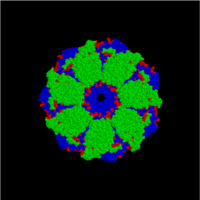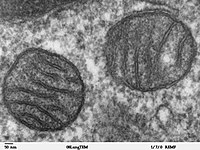
An update on the unfolded protein response in brain ischemia: Experimental evidence and therapeutic opportunities
Sign Up to like & getrecommendations! Published in 2021 at "Neurochemistry International"
DOI: 10.1016/j.neuint.2021.105218
Abstract: After ischemic stroke or cardiac arrest, brain ischemia occurs. Currently, no pharmacologic intervention that targets cellular processes has proven effective in improving neurologic outcome in patients after brain ischemia. Recent experimental research has identified the… read more here.
Keywords: unfolded protein; protein response; brain; brain ischemia ... See more keywords

Neuroprotective effects of valproic acid on brain ischemia are related to its HDAC and GSK3 inhibitions
Sign Up to like & getrecommendations! Published in 2018 at "Pharmacology Biochemistry and Behavior"
DOI: 10.1016/j.pbb.2018.02.001
Abstract: ABSTRACT Valproic acid (VA) is an antiepileptic that is also used for the treatment of bipolar disorders. The objective was to evaluate the neuroprotective effects of VA on a brain ischemia model. The groups of… read more here.
Keywords: neuroprotective effects; brain ischemia; hdac gsk3; valproic acid ... See more keywords

Oleoylethanolamide inhibits glial activation via moudulating PPAR&agr; and promotes motor function recovery after brain ischemia
Sign Up to like & getrecommendations! Published in 2019 at "Pharmacological Research"
DOI: 10.1016/j.phrs.2019.01.027
Abstract: &NA; Glial activation and scar formation impede the neurological function recovery after cerebral ischemia. Oleoylethanolamide (OEA), a bioactive lipid mediator, shows neuroprotection against acute brain ischemia, however, its long‐term effect, especially on glial scar formation,… read more here.
Keywords: motor function; glial activation; ppar agr; brain ischemia ... See more keywords

Activation of 5-HT1A postsynaptic receptors by NLX-101 results in functional recovery and an increase in neuroplasticity in mice with brain ischemia
Sign Up to like & getrecommendations! Published in 2020 at "Progress in Neuro-Psychopharmacology and Biological Psychiatry"
DOI: 10.1016/j.pnpbp.2019.109832
Abstract: Pharmacological interventions that selectively activate serotonin 5-hydroxytryptramine-1A (5-HT1A) heteroreceptors may prevent or attenuate the consequences of brain ischemic episodes. The present study investigated whether the preferential 5-HT1A postsynaptic receptor agonist NLX-101 (a.k.a. F15599) mitigates cognitive… read more here.
Keywords: brain ischemia; neuroplasticity mice; brain; ht1a postsynaptic ... See more keywords

microRNAs Alterations of Myocardium and Brain Ischemia-Reperfusion Injury: Insight to Improve Infarction.
Sign Up to like & getrecommendations! Published in 2020 at "Immunological investigations"
DOI: 10.1080/08820139.2020.1808672
Abstract: Heart and cerebral infarctions, as two important ischemic diseases, lead to the death of tissues due to inadequate blood supply and high mortality worldwide. These statuses are started via blockage of vessels and depletion of… read more here.
Keywords: brain ischemia; alterations myocardium; reperfusion; micrornas alterations ... See more keywords

Stem cell therapy in brain ischemia-the role of mitochondrial transfer.
Sign Up to like & getrecommendations! Published in 2020 at "Stem cells and development"
DOI: 10.1089/scd.2019.0237
Abstract: Mitochondrial dysfunction is an important pathological process in the setting of ischemic brain injury. Stem cell-mediated mitochondrial transfer provides an efficient intercellular process to supply additional mitochondria in the ischemic brain tissues. In this review,… read more here.
Keywords: mitochondrial transfer; brain ischemia; stem cell; stem ... See more keywords

The phosphodiesterase type 2 inhibitor BAY 60‐7550 reverses functional impairments induced by brain ischemia by decreasing hippocampal neurodegeneration and enhancing hippocampal neuronal plasticity
Sign Up to like & getrecommendations! Published in 2017 at "European Journal of Neuroscience"
DOI: 10.1111/ejn.13461
Abstract: Cognitive and affective impairments are the most characterized consequences following cerebral ischemia. BAY 60‐7550, a selective phosphodiesterase type 2 inhibitor (PDE2‐I), presents memory‐enhancing and anxiolytic‐like properties. The behavioral effects of BAY 60‐7550 have been associated… read more here.
Keywords: neuronal plasticity; bay 7550; ischemia; brain ischemia ... See more keywords

Shifting Perceptions of Risk and Reward: Use of Anticoagulation in Patients With Acute Brain Ischemia and Atrial Fibrillation Nine-Year Data From a National Acute Stroke Registry (National Acute Stroke Israeli Survey [NASIS])
Sign Up to like & getrecommendations! Published in 2017 at "Stroke"
DOI: 10.1161/strokeaha.116.015776
Abstract: Background and Purpose— Despite overwhelming evidence for the benefits of anticoagulation in patients with brain ischemia and atrial fibrillation, vast underuse has been reported. Methods— Use of anticoagulation for secondary stroke prevention was assessed in… read more here.
Keywords: atrial fibrillation; anticoagulation; national acute; brain ischemia ... See more keywords

Thromboinflammation in Brain Ischemia: Recent Updates and Future Perspectives
Sign Up to like & getrecommendations! Published in 2022 at "Stroke"
DOI: 10.1161/strokeaha.122.038733
Abstract: Despite decades of promising preclinical validation and clinical translation, ischemic stroke still remains as one of the leading causes of death and disability worldwide. Within its complex pathophysiological signatures, thrombosis and inflammation, that is, thromboinflammation,… read more here.
Keywords: thromboinflammation; thromboinflammation brain; updates future; brain ischemia ... See more keywords

Novel Insights into the Molecular Mechanisms Involved in the Neuroprotective Effects of C-Phycocyanin Against Brain Ischemia in Rats.
Sign Up to like & getrecommendations! Published in 2022 at "Current pharmaceutical design"
DOI: 10.2174/1381612828666220506145542
Abstract: BACKGROUND Ischemic stroke produces a large health impact worldwide, with scarce therapeutic options. OBJECTIVE This study aimed to reveal the role of NADPH oxidase and neuroinflammatory genes on the cerebral anti-ischemic effects of C-Phycocyanin (C-PC),… read more here.
Keywords: brain ischemia; brain; insights molecular; effects phycocyanin ... See more keywords

Flavonoids and its Neuroprotective Effects on Brain Ischemia and Neurodegenerative Diseases.
Sign Up to like & getrecommendations! Published in 2018 at "Current drug targets"
DOI: 10.2174/1389450119666180326125252
Abstract: Brain ischemia is among the leading cause of death with majority of the cases are associated with ischemic strokes. It can occur in two forms of either focal or global ischemia. Neurodegenerative disorder such as… read more here.
Keywords: flavonoids neuroprotective; neuroprotective effects; brain ischemia; brain ... See more keywords